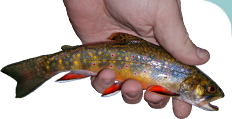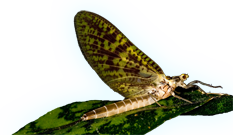Blog & Latest Updates
Fly Fishing Articles
Insects by Common Name


> > Midge?
| Dossphoto | February 20th, 2010, 3:48 am | |
| virginia Posts: 2 | I found this fly hatching somewhat heavily the other day. Air temp was around 33°F and the water temp was 39°F. I was in the Smith River in Southern Virginia. Anyone have any ideas?  | |
| Taxon | February 20th, 2010, 1:05 pm | |
Site Editor Royse City, TXPosts: 1350 | Darrin- Not a midge (family Chironomidae); appears to be a black fly (family Simuliidae). | |
| Best regards, Roger Rohrbeck www.FlyfishingEntomology.com | ||
| Dossphoto | February 20th, 2010, 5:03 pm | |
| virginia Posts: 2 | Thanks! I had always thought of black flies as being a warmer weather fly. I wasn't really expecting them this time of year. Although that does explain why the fish were ignoring my black midge patterns. | |
| Gutcutter | February 21st, 2010, 4:38 pm | |
| Pennsylvania Posts: 470 | if the fish were rising to these "blackflies" and you had a fly of the same size, general shape and shade(+/-) then they should have taken your offering as long as it was presented well. a trout does not know latin the way some of us do. they will eat what is available. maybe taxon can tell us if there are differences in how a midge emerges vs a blackfly. i am wondering if these bugs are related to the african blackfly (also simuliidae) that are the vector for river blindness (Onchocerca volvulus). i learned some latin, too as a research student studying parasitology. also are these related to the horrific bahamian bug that bears the same common name? a bonefish guide once responded to my question of "what kind of insects are they" as "dey bitey bugs mon" gut | |
| All men who fish may in turn be divided into two parts: those who fish for trout and those who don't. Trout fishermen are a race apart: they are a dedicated crew- indolent, improvident, and quietly mad. -Robert Traver, Trout Madness | ||
| Taxon | February 21st, 2010, 8:09 pm | |
Site Editor Royse City, TXPosts: 1350 | Tony- Don't have any experience with fishing to emerging black flies, but would observe they have a different profile that a chironomid, as they are much wider for their length. My suspicion would be that, much like chironomids, their pupal lifestage would be the one more successfully imitated by a fly fisher. | |
| Best regards, Roger Rohrbeck www.FlyfishingEntomology.com | ||
| Wbranch | February 23rd, 2010, 3:31 am | |
| York & Starlight PA Posts: 2733 | "a trout does not know latin the way some of us do. they will eat what is available." I agree with Mr. Cutter, if your black midge pattern was similar in size and shape to the emering insect, and you presented the fly properly, in most cases the fish would eat your offering. | |
| Catskill fly fisher for fifty-five years. | ||
Quick Reply
You have to be logged in to post on the forum. It's this easy:
Related Discussions
| Title | Replies | Last Reply |
| Re: Griffiths Gnat In Fly Tying by Mcflyangler | 1 | Jun 20, 2016 by Flytyerinpa |
| Re: help with midge adult In the Identify This! Board by Cherylkorca | 2 | Feb 18, 2020 by Cherylkorca |
| Re: Those Darn Olives In Male Baetis Mayfly Dun by Martinlf | 10 | May 30, 2009 by Martinlf |
| Re: Winter Steelheading Round 4! In the Photography Board by Pryal74 | 4 | Mar 8, 2011 by Pryal74 |
| Re: Maruto vs Tiemco Hooks In Fly Tying by Walleye | 3 | Mar 10, 2014 by Entoman |
| Re: Identification of a possible Cordulegaster Dragonfly Nymph In Cordulegaster Dragonfly Nymph by IanB | 6 | Feb 10, 2017 by Taxon |
| Re: Todays exam....guess the bug In General Discussion by Kroil | 9 | Mar 13, 2008 by Martinlf |
| Re: Smallmouth bass In Fishing Reports by Wbranch | 7 | Oct 27, 2015 by Jmd123 |
| Re: Jigs In Fly Tying by Megjig | 2 | Mar 31, 2017 by PABrownie |
| Re: Ameletus and Paraleptophlebia In the Photography Board by Millcreek | 8 | Jun 4, 2016 by Hansolo |
Troutnut.com is copyright © 2004-2024 Jason
Neuswanger (email Jason). See my FAQ for information about use of my images.
 privacy policy
privacy policy



